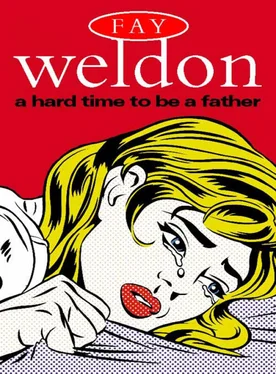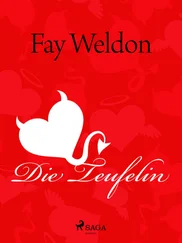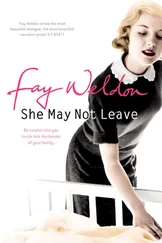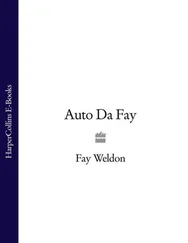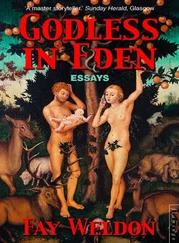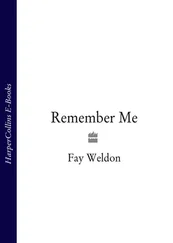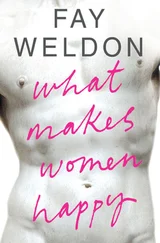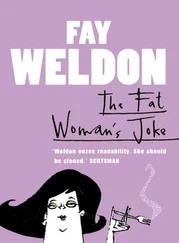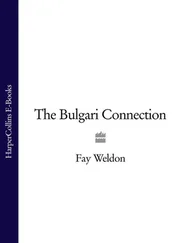‘I was born on Christmas Day 1972, and the earth moved. Ten thousand people died in an earthquake in Nicaragua. I was the youngest child of six, an afterthought, born when my mother Juliet was forty-two. She only became pregnant with me, my mother once told her friends, and I overheard, to give herself an excuse to stop seeing you.’ ‘Really,’ remarked Miss Jacobs, puzzled, ‘can that be so?’
‘It’s what she told me,’ said Clarissa, ‘which makes you responsible for my life. I have always felt so, and never passed your door without a certain frisson . Anyway, my mother’s guilt was such, great sums of money were spent converting a box-room into a nursery on my account, the better to welcome me into the world. It would have been better sent to the victims of the earthquake. I could have shared with Severo, aged two at the time of my birth.’
‘Perhaps your mother just wanted to welcome you into the world,’ observed Miss Jacobs, ‘it may not necessarily have been guilt that motivated her.’
‘On my first birthday,’ said Clarissa, ignoring this, ‘the nation was in the middle of a three-day week; the power stations closed; TV programmes stopped at ten-thirty, and my mother bought me a teddy bear so big it could hardly get through the door. It sits at the end of my bed to this day. My father left home on Christmas Eve; he’d found a lover in my mother’s bed. The couple were both asleep and I had crawled in beside them. I don’t remember the scene; I have buried the memory, no doubt. But the teddy bear from my mother was guilt on her part, of course it was. Only spend, my mother thought, and all will be well. She should have given the money to the striking miners.’
‘Should, should,’ murmured Miss Jacobs.
‘Potlatch only happens when there is plenty,’ said Clarissa.
‘The North Pacific Indians lived in a pleasant, fertile land. Deer were plentiful, edible roots were at hand, and salmon ran up the rivers. My father made millions as a designer of contemporary furniture. And of course he felt guilty too, for his five abandoned daughters and one abandoned son. Tax never took enough away.’
‘That is quite a rare response to tax,’ said Miss Jacobs. ‘In fact in all my working life I have never heard anyone say such a thing.’
‘By Christmas 1974,’ said Clarissa, ‘inflation in Britain had reached 25 per cent. Teachers that year got a 32 per cent pay rise. And what was my mother’s response? Spend, spend, spend! The Sex Discrimination Act and the Equal Pay Act came into force three days after my birthday in 1975, and did my mother get a job? No, she just asked for more alimony. By my third birthday my leisure years were considered over, and while a Rhodesian terror gang killed twenty-seven of their own – how puny massacres were in those days – I was finger-painting Christmas cards for my four sisters, my one brother, my absent father, my new stepfather and his three sons. And after that, it was downhill all the way. My mother’s generosity and kindness increased my annual present list exponentially. Thanks to you she never quarrelled with husbands or lovers, she simply left or was left, and kept on good terms with everyone, even my father. Like wrongly-folded prions, those in need of gifts and friendship latch on, and I, like her, spend the Christmas season, when so many world disasters happen, wrapping presents and attaching baubles. Warfare by generosity. Potlatch: who gives, wins.
‘On my seventh birthday the Vietnam boat people took to the seas and my mother adopted a little Vietnamese boy. She always preferred sons. On my eighth, the Iranians rose against the Shah and welcomed the Ayatollah Khomeini (out of the kettle into the fire, some say) and I was given the most expensive bicycle Harrods could offer. For my ninth my mother was away in the States for John Lennon’s funeral; on my tenth my mother should have been at Greenham, but she wasn’t. My mother was not the kind to damage her nails linking hands with muddy women, not even to save the world.’
‘Perhaps this obsession with birthdays,’ remarked Miss Jacobs, ‘is because you feel deprived by fate. Children whose birthday is near or on Christmas Day often have to make do with one set of presents.’
‘You must have told my mother that,’ said Clarissa, ‘and she believed it. I always got at least five times as much as my many and varied siblings, and they know it, and dislike me for it, and the more they dislike me, the more I feel obliged to give them.
‘In December 1980 at least two thousand people were killed by Union Carbide at Bhopal, but nothing daunted my mother’s gift-wrapping fervour. Could we have bread and cheese for Christmas dinner, and do without on their account? No. In October 1987 a tree fell through a conservatory roof in the great gale so that Christmas we ate in the kitchen and the maid stayed home, but that was our own misfortune, not the world’s. In December 1988 an earthquake in Armenia wiped cities off the face of the earth and a hundred thousand died, but my family’s annual Christmas fund remained undented. On my birthday in 1991 Gorbachov resigned and the Soviet Empire came to an end, and our turkey was too big to go into the oven. In December 1993 the South African parliament voted itself out of existence and over the Christmas Day sherry, I heard my mother ask someone, “What is apartheid anyway? Is it a city?”
‘Do you know what I have in all those wet shopping bags? I have gifts for my sisters Saffron, Jubilant, Cleopatra and Severo, and my brother Aurelius, and my little adopted brother Min, and presents for my father Harry, and his later wives, Mandy and Debbie and Peacock, a transsexual, and my ex-stepfather Richard, and his boys Charles, David and Bill, and my new stepfather Gavron and his sister Cassandra, who’ll be upset if she’s left out – she is suicidal. And there are so many grandparents on all sides, not to mention aunts, uncles, cousins, I don’t know what to do, but those you forget don’t forgive. And Saffron and Jubilant are both pregnant and what worries me is that now the next generation is coming along and, as with the flat-folded non-destructible prion, growth of family members will be exponential and podatch frenzy never be at an end, and how will I ever find time or strength to save the world? I blame my mother. And the shops are shut and I have no gift for Saffron’s partner or Jubilant’s husband and I can’t even remember their names. I’m so tired.’ And Clarissa’s tears were renewed.
‘What we regret for the dead, the poor and distressed,’ said Miss Jacobs, ‘is that they are not alive, spending and happy. We might as well have a good time while we can, in their honour, if indignation will allow. There’s such a thing as going too far, I do agree, but all will yet be well.’
When Clarissa was calm again she and Miss Jacobs both put on raincoats, and went down the street to where there was a skip and emptied out the contents of the carrier bags – a myriad packages and parcels, gold and red and green, all glittery with Christmas goodwill – so they tumbled down into wet rubble and in between paint-peeled planks of worm-eaten wood. And if the minute Miss Jacobs and Clarissa were gone a host of shadowy figures stretched skinny arms out of the damp dark to retrieve them, so much the better.
The woman drove. The man was the passenger. She was English. He was German. She was in her fifties, tough and bright and not yet finished with sex. She wore a vivid green shirt and jacket. His hand rested on her knee. He was thirtyish, blond, gentle-eyed; sharp, childish features clouded by a soft fuzzy beard. He thought she was invincible, wonderful, and often told her so.
Stella had things to do in Oslo, she said: a couple of people to see: a few loose ends to tie up. She’d appreciate company. Lothar was a children’s book illustrator; a couple of commissions had fallen through: he had time to spare. They’d met in a bar in his home-town, Berlin, and gone home together. She was in business, she said; he was not sure what it was. She lived in Ipswich, England.
Читать дальше
